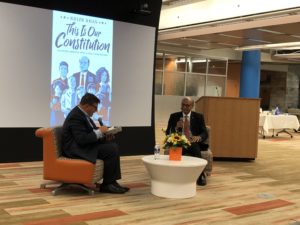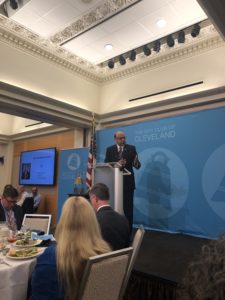 .
.
Everyone has ‘linguistic markers’. Sometimes they mark where you are from geographically, like ‘Baah Haaaabah” for Bostonians. Sometimes they mark what religion you are, like saying ‘mashallah’. Sometimes it’s just your signature word, like Ray Bradbury’s ‘cinnamon’.
Mr. Khizr Khan has three linguistic markers I picked up on during the two days I spent with him at talks in venues around Cleveland: ‘blessed’, ‘uplift’, ‘and candle bearer’. I don’t know what words Mr. Khan uses most often in everyday conversation, but his message featured these at much higher rates than any others.
It’s not surprising that ‘candle bearer’ is a signature phrase, given that he glows with the inner peace of a man doing his God-given work. But it is a challenging and inspiring phrase. Mr. Khan describes the path as dark, and the candle bearers must walk front and center to lead the way. Mr. Khan challenged every single person to harness their light and use their platform for change, be it waking up early to vote, taking someone who cannot drive to the polling station, standing up and saying one person, one vote does matter. Whatever your platform, use it. Mr. Khan reminded us that history shows us one person’s voice can change the world. “Give me liberty or give me death” is a political reality that many around the world contend with, but we in America are not forced to consider it when we send a tweet or state our opinion. Mr. Khan, however, has lived through it, and that is why he is so passionate about our United States’ Constitution.
Mr. Khan recounted how he first fell in love with the US Constitution–yes, in love. That is how deeply Mr. Khan values the words that form this idea of a More Perfect Union. It was during a comparative law class that put constitutions from around the world side by side and compared the merits or each. Nothing compared, in his mind, to the 4,543 words that make up this ‘blessed document’. The fire that was lit inside him eventually took him to America to get not one, but two LL.M. degrees from the University of Missouri Law School and Harvard Law School. It gave him a career in and a passion for law that he spreads as a doctrine of freedom and justice. And like many newcomers to the United States, Mr. Khan is deeply patriotic and grateful to this country. He spoke passionately about the 1st and 14th amendments in each talk he gave.
Pop quiz: how many rights are enshrined in the 1st amendment? How are Plessy v. Ferguson and Brown v. Board related?
You probably cannot answer those questions unless you are in 10th grade civics. And that is just Mr. Khan’s point. We take our freedom of speech for granted. We take for granted the fact that inhumane court decisions can be overturned when our mistakes have been made clear.

Mr. Khan spoke with the passion of Martin Luther King Jr., but at the level of Mother Teresa. He cried on stage, pausing to ask the crowd forgiveness for losing his composure. He openly acknowledged that each speech he gives tears open the wound left by the death of his middle child, Captain Humayun Khan, who was inspired by the service of President Thomas Jefferson to enroll in the ROTC program at the University of Virginia. Mr. Khan notes that he lives at the bottom of the mountain where Monticello sits, and that it was a total coincidence that he should live in the shadow of the Founding Father’s home and legacy, and that to his home are delivered bags full of letters, some only addressed “Mr. Khizr Khan, United States of America.” This man single-handedly made the United States Constitution the the best selling book in the world on Amazon, which runs out of it regularly since Mr. Khan took to the speaker circuit 3 years ago. This is also a man who was warned to stay inside during the protests in Charlottesville where, as Mr. Khan said, “our daughter, Heather Heyer, was killed”, but he saw firsthand the heavily-armed protesters and heard their ugly chants. People like this man were the aim of their ire, and yet he continues to speak. He continues to bear the light. He continues to uplift the best in us and to defend that which allows the best in us to thrive– the rule of law, checks and balances, an independent judiciary, and a government by the people, for the people.
I could share many more stories of Mr. Khan’s, but I encourage you to see him when he visits you, or invite him to do so yourself. I will leave you with a story Mr. Khan’s grandfather in Pakistan would share with him after the sun had set, the dinner was eaten, dishes washed, homework completed, and the stars shone in the sky: A thirsty man is blocked from the river by a high wall, so high the man cannot climb it. The man, desperate in his thirst, throws a rock from the wall over it and into the river. The sound of the rock in the water fills the man with joy and hope. The man forgetting his thirst continues to throw rocks into the water. The water asks the man, ‘Why do you throw stones into the water you cannot drink?” The man replies, “Because the beautiful sound of its splashing fills all living things with joy, it is like the sound of the guard’s keys to a prisoner, the sound of rain in the desert, and every stone I throw makes the wall a little lower.” Mr. Khan encouraged us all to be like that man: joyous in our struggle, passionate in the pursuit of our goals, and hungry for the sweet drink of redemption.
“I have seen the sunrise on the other side of the mountain and it is just moments away.”
I would take Mr. Khan at his word. The night is darkest before the dawn, but that is why we are candle bearers.

